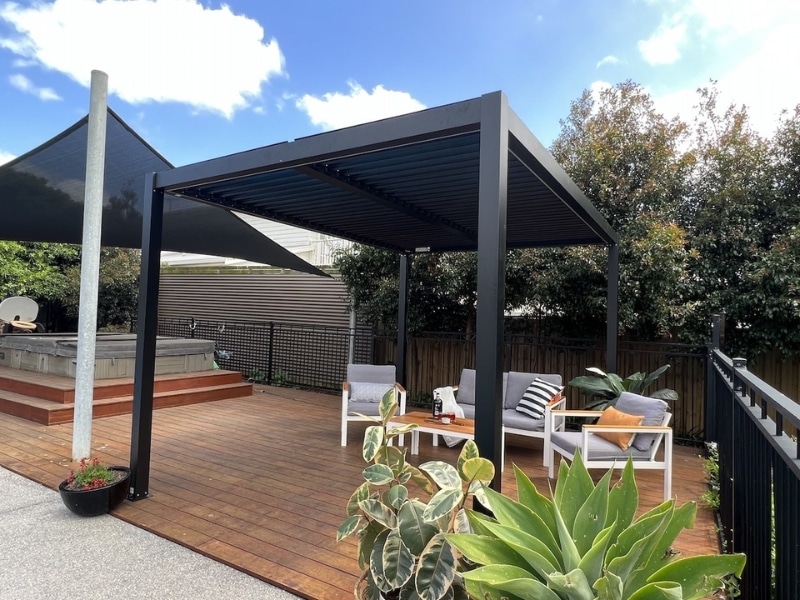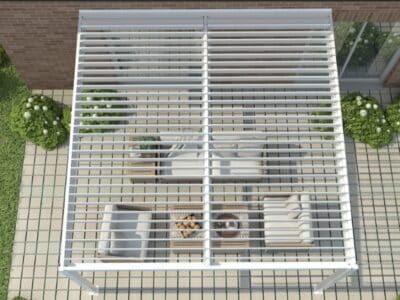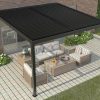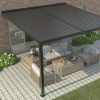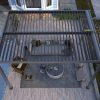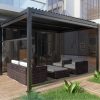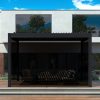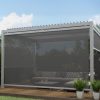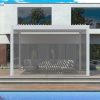Blog
Designing a pergola for a small backyard can feel like solving a puzzle. You want beauty and function without overwhelming your space. While it may seem limiting, the right design can actually transform a tight yard into something truly inviting. Whether you’re considering fixed or flexible options, thoughtful planning goes a long way. This article explores how to make the most of garden pergola designs in compact outdoor areas.
What limitations do small yards pose for garden pergola designs?
Limited space isn’t just about square footage—it impacts sightlines, usability, and airflow. Poor design choices in tight areas can block sunlight, restrict foot traffic, and cramp seating. It’s important to know where constraints begin before you get creative.
- Narrow yards restrict pergola size and layout flexibility
- Trees, fences or sheds can interfere with overhead beams
- Close neighbours may reduce privacy and limit sun access
- Council setback requirements can limit positioning
You’ll often find reduced privacy and airflow in a tightly spaced yard. That creates challenges not just for shade but for usability. Adding too many built-in features can make the area feel claustrophobic. That said, a well-placed pergola can counteract these effects by drawing the eye upward and defining zones—if the design is properly suited to the space.
How do small backyards limit the options for installing a pergola?
Most small yards force you to be precise with every millimetre. The depth and width of your pergola must complement your existing outdoor layout, not conflict with it. That’s especially true in courtyards or terrace-style gardens where every decision counts.
- Fence proximity may limit post depth and spacing
- Paving or tiling can restrict anchoring options
- Limited green space can make planting climbing plants difficult
- Awkwardly shaped yards often mean prefabricated designs won’t fit well
Rather than guessing, it’s wiser to opt tailored pergola design solutions that maximise outdoor living space. Tailored designs account for slope, setbacks, drainage and access—essential factors that can make or break functionality in small backyards. Pre-made kits rarely cater to these nuances.
What issues arise from poorly planned pergola placement?
Placement problems often lead to regret. A pergola that’s too close to your house might block key windows. Place it too far out, and it may overwhelm the lawn. In small backyards, these missteps become apparent quickly.
- Overshadowing indoor living spaces and cutting off light
- Blocking access to doors or footpaths
- Creating unused “dead” space on either side
- Complicating garden maintenance unnecessarily
The real sting comes when mistakes not only cost comfort but also reduce resale value. A skewed or awkward structure can leave a cramped impression. You can avoid this by understanding how pergola sizes influence backyard shade and comfort, especially in smaller blocks where flexibility is limited. Measure twice, build once—it’s not just a saying, it’s essential here.
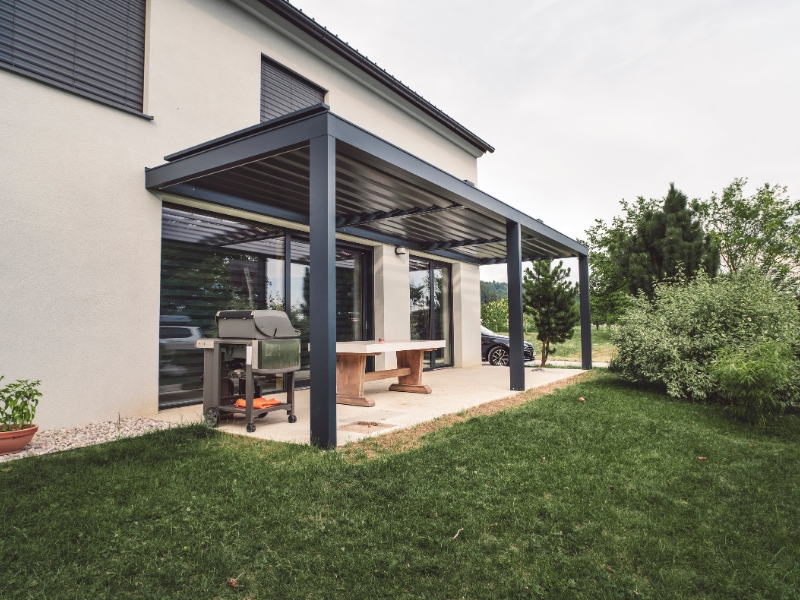
Which garden pergola designs optimise small outdoor areas?
Some pergola designs work better than others in small yards. Instead of classic square models, angled or cantilevered versions can open up room. Think vertical elements, open slats, and retractable coverings.
- Wall-mounted pergolas save space by skipping two posts
- Corner or L-shaped designs free up movement zones
- Slimline beams reduce visual weight overhead
- Transparent or slatted roofing increases natural light
One of the biggest advantages of wall-mounted pergolas is their ability to tuck into corners or span patio doors without cluttering your yard. These designs not only save space but also help define distinct zones—like dining versus lounging—even in compact areas.
If your yard has odd angles or uneven levels, choosing pergola dimensions for tighter backyard layouts can help you create a bespoke design. Avoid cookie-cutter dimensions—they rarely do small yards justice.
| Pergola Style | Ideal For Small Yards | Space Efficiency | Visual Openness |
| Wall-mounted | Yes | High | Moderate |
| Cantilevered | Yes | Very High | High |
| Freestanding | Maybe | Low–Medium | Depends on size |
| Retractable roof | Yes | High | Very High |
Can adjustable features enhance garden pergola designs for small spaces?
Fixed structures can limit you. Small backyards benefit from flexible elements that shift with the weather or your mood. Adjustable pergolas can be literal game changers.
- Retractable canopies offer control over light and temperature.
- Louvered roofs provide control over airflow and shade
- Sliding screens or blinds offer instant privacy
- Folding or collapsible posts can be removed seasonally
These tweaks help avoid the heaviness that static designs can create in tight quarters. Not only does that make your yard more usable, but it also adapts to a wide range of weather conditions.In Australia’s climate, such adaptability isn’t just a perk—it’s a necessity.
If you’re navigating a narrow block or tight rear access, understanding how backyard orientation affects shade coverage will also inform which features you need to prioritise. What works for a north-facing yard won’t always suit an east-facing one.
Should the sun’s direction affect your garden pergola layout?
Absolutely. A pergola positioned without regard to sun direction could leave you sweltering in summer or freezing in winter. A thoughtful layout lets you work with the sun, not against it.
- North-facing pergolas collect winter sun while blocking summer highs.
- East-facing designs catch the morning sun, ideal for a breakfast space.
- A west-facing location can overheat without a shading element.s
- South-facing buildings require careful material selection to maintain warmth.
A poor orientation creates heat traps or cold pockets, making the space less usable throughout the year, for smaller areas where every square metre counts, getting the layout right from the start can mean the difference between comfort and regret.
Use eaves, louvers or deciduous vines to manage light seasonally. You don’t always need a whole roof—you just need the right angle.
What makes a pergola truly suitable for small backyard living?
It comes down to more than dimensions. A small backyard pergola must deliver function without fuss. It should suit the rhythm of your home, provide shelter and structure, and look intentional.
- Materials should match the surrounding home and landscape.
- Roof style should complement sun access and drainage.
- Built-in seating or planters can maximise utility.
- Design should preserve the flow between the house and yard.
Significantly, scale matters. A pergola that’s too bulky feels like a leftover from a bigger project. Yet one that’s too delicate won’t serve its purpose. The key is balance—and knowing what to leave out. You want a structure that blends in while also standing out. No easy feat, but not impossible either.
Final thoughts
Small backyards can shine with the right pergola design—it just takes a bit of thinking ahead. You’re not limited; you’re simply working with a tighter brief. The good news is that constraints often inspire better design outcomes. A focused design usually means a smarter outcome, especially when it’s tailored to your block, lifestyle and light needs. For a closer look at small space solutions, discover how Unique Pergolas can enhance outdoor living spaces.

